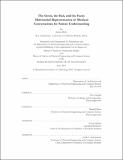The good, the bad, and the facts : multimodal representation of medical conversations for patient understanding
Author(s)
Berry, Jaclyn(Jaclyn Elizabeth Hom)
Download1135802053-MIT.pdf (3.723Mb)
Alternative title
Multimodal representation of medical conversations for patient understanding
Other Contributors
Massachusetts Institute of Technology. Department of Architecture.
Massachusetts Institute of Technology. Department of Electrical Engineering and Computer Science.
Advisor
Terry Knight and Randall Davis.
Terry Knight and Randall Davis.
Terms of use
Metadata
Show full item recordAbstract
Medical patients face significant challenges for managing their health information. In particular, cancer patients have a uniquely difficult experience where they must endure the physical and emotional effects of their illness while simultaneously navigating overwhelming amounts of medical information. In this thesis, I focus on the challenge of capturing, reviewing and extracting information from medical appointments for patients enduring serious health conditions such as cancer. First, I propose a novel multimodal-interface to help patients review and understand information they received from conversations with their doctors. This interface captures medical conversations as text and audio, with important positive and negative information highlighted. I conducted 25 user studies where I enacted fictional conversations between a doctor and a patient to evaluate whether this method of representing information would help patients review and understand their appointments. Results from the user studies show that the web interface serves as a useful tool for reviewing the content of the conversations, however its effect on patient understanding cannot yet be determined. Second, I propose a machine learning algorithm to automatically classify the positive and negative information in medical conversations based on analysis of the text and prosody in speech. The model with the highest performance on my dataset achieved an accuracy of 90.6% and Fl-score of 0.888. While I focus on challenges within the medical field, findings from this thesis may be relevant to emotional conversations in any setting such as sportscasting, political debates and more.
Description
This electronic version was submitted by the student author. The certified thesis is available in the Institute Archives and Special Collections. Thesis: S.M., Massachusetts Institute of Technology, Department of Architecture, 2019 Thesis: S.M., Massachusetts Institute of Technology, Department of Electrical Engineering and Computer Science, 2019 Cataloged from PDF version of thesis. Includes bibliographical references (pages 131-136).
Date issued
2019Department
Massachusetts Institute of Technology. Department of Architecture; Massachusetts Institute of Technology. Department of Electrical Engineering and Computer SciencePublisher
Massachusetts Institute of Technology
Keywords
Architecture., Electrical Engineering and Computer Science.